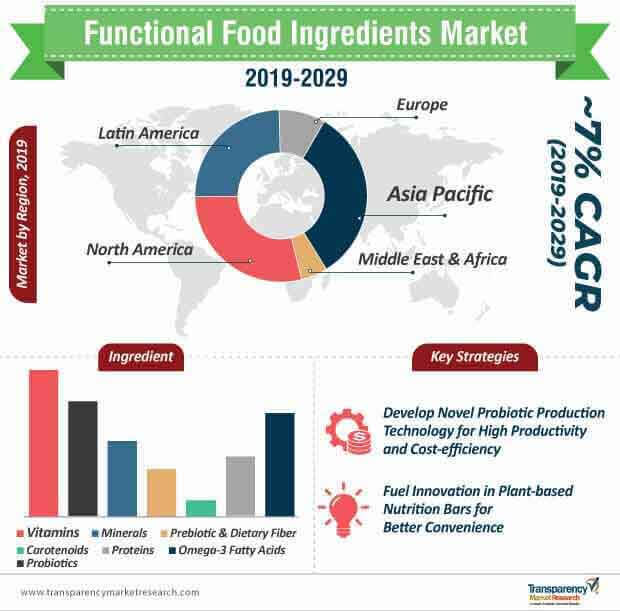
Standardization of Production Techniques: Winning Imperative for Functional Food Ingredients
The global functional food ingredients market is estimated to reach a production level of ~3,360 metric tons in the year 2029. Due to the high growth potential of this market, manufacturers are innovating on novel probiotic technologies that increase production in cost-efficient ways.
The unique technology involves metabolite agnostics that speed up the fermentation of probiotic strains. This helps reduce the time of the production of the probiotics, and increases yield outcome. Since conventional production methods involve a lengthy fermentation period, manufacturers are adopting new technologies that accelerate the fermentation process and reduce the cost of probiotic products for consumers. This results in a win-win situation for both, manufacturers and consumers.
Manufacturers are also innovating on first-of-its-kind high-protein and high-lutein chilli with decreased levels of pungency. The micro-injection technology enriches protein in chillies, which contributes as a useful addition to functional food ingredients. Also, cross-breeding helps stabilize the formulation, and standardization of the process increases the bioavailability of the phytonutrients for the development of nutraceuticals.
Request a sample to get extensive insights into the Functional Food Ingredients Market?

Manufacturers Innovate on Energy-rich Nutrient Bars for Better Convenience
Convenience and on-the-go foods are driving market growth for functional food ingredients. Likewise, nutritional bars hold intrinsic health value for consumers. The production of vitamin-based ingredients is currently valued at ~156 billion metric tons. This is why manufacturers are adding specific nutrients such as vitamins, minerals, dietary fibers, and prebiotics to cater to the specific functional purposes of consumers.
Consumers demand products that boost energy levels, which is very convenient as far as energy bars are concerned. Since protein is one of the top functional food ingredients, manufacturers are innovating on protein bars that aid in weight management, improved muscle mass, and increased energy. Due to the high demand for natural ingredients without allergens, manufacturers are producing energy bars made with nuts and soy.
For consumers suffering from lactose intolerance, manufacturers are producing plant-based bars using almond butter, cocoa butter, pea protein, sunflower seeds, and the like. With the growing awareness about gluten-free and GMO-free (Genetically Modified Organisms) food products, manufacturers are producing functional food ingredients that are also free from artificial flavors and preservatives.
Request for Covid-19 Impact Analysis @ https://www.transparencymarketresearch.com/sample/sample.php?flag=covid19&rep_id=10751
Efficient Regulation Norms and Consumer Acceptance Streamline NDP
Product development and innovation are important pillars that support market growth for functional food ingredients. However, manufacturers are challenged with the redundant perception of consumers about functional food ingredients. Common misconceptions such as the side effects of food supplements may hamper market growth.
Also, stringent regulations have an influence on the market growth of functional food ingredients. Due to these regulations, companies need to compete for health claims with multiple attempts of clinical trials and approvals from government authorities, which also increases the cost. As such, high investment poses a hurdle for emerging market players that have limited financial resources.
Hence, market players should maximize on consumer acceptance. The success of food supplements and other products with new functional ingredients depends upon the interplay between knowledge management and deployment amongst consumers. Also, consumer-related research prior to new product development (NDP) will help manufacturers understand their needs and increase consumer acceptance for functional food ingredients.
For More Info View @ https://www.transparencymarketresearch.com/casestudies/food-and-beverages-case-study





